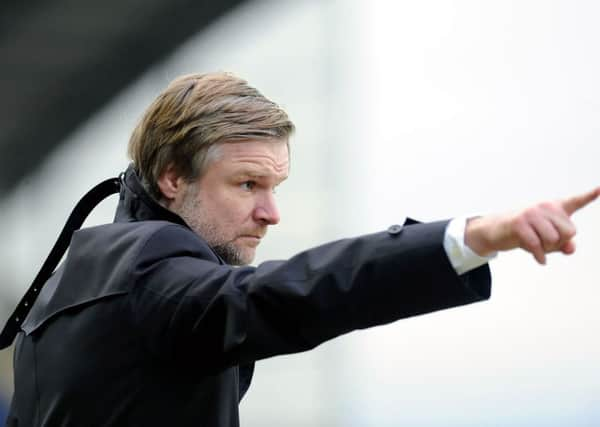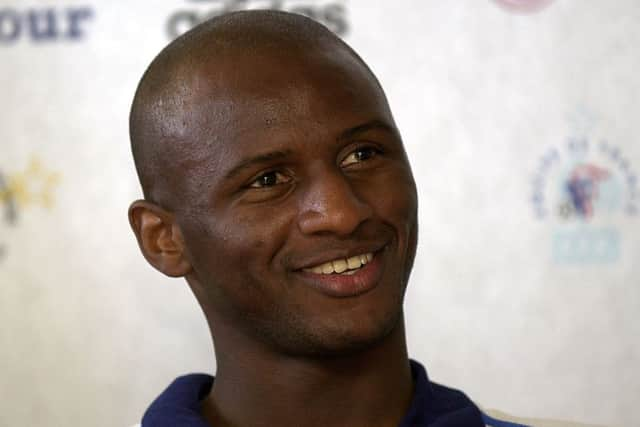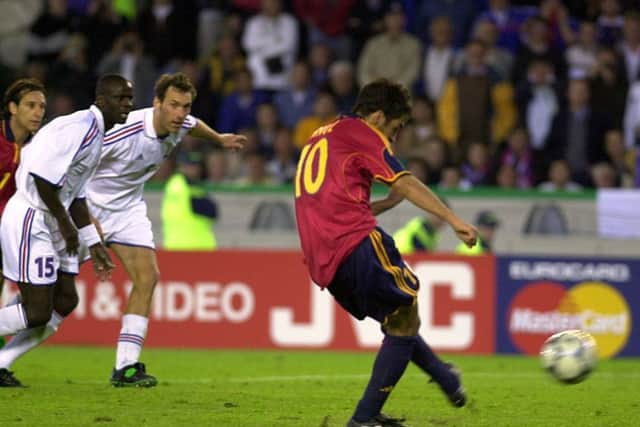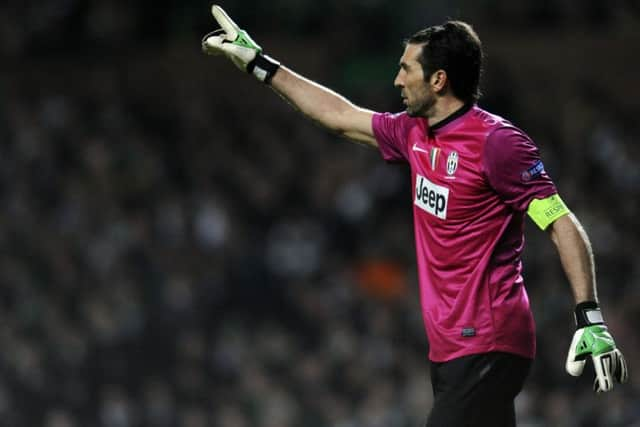When Scotland's youngsters rubbed shoulders with the global giants


But the side bossed by Craig Brown which took on Holland, Switzerland and hosts England at Euro ‘96 weren’t the only Scotland squad to rub shoulders with the continent’s elite that year.
The finals of the 1996 European Under-21 Championships took the form of a four-team competition featuring host nation Spain, Italy, France and - believe it or not - Scotland.
Advertisement
Hide AdAdvertisement
Hide AdAnd a look at the squads reveals that for a number of players taking part it was the start of a glittering career which would see them go on to become global icons and enjoy success at the very highest level.


But Steven Pressley, one of the key members of that Scotland squad, believes that unless there’s a radical overhaul of the way we develop players in this country, the opportunity to compete at that level will be nothing more than a dream for the next generations of Scottish talent.
For Pressley, being part of a Scotland squad which mixed it at the business end of a major international tournament with some of the game’s greats was a memorable experience.
Spain were led by none other than Real Madrid legend Raul and could also call on the likes of Gaizka Mendieta, Fernando Morientes, Aitor Karanka and Ivan de la Pena.
Advertisement
Hide AdAdvertisement
Hide AdFuture World Cup winners Patrick Vieira, Robert Pires and Vincent Candela were all in a French squad which also included Claude Makelele and Sylvain Wiltord (as well as future Rangers players Lionel Letizi and Jerome Bonissel).


And the Italian contingent which headed to Barcelona included none other than Juventus legend Gianluigi Buffon, Roma’s icon Francesco Totti and Fabio Cannavaro - who would later go on to captain his country to victory in the World Cup Final - alongside mere ‘mortals’ such as Alessandro Nesta, Alessio Tacchinardi and Christian Panucci.
Scotland actually equipped themselves reasonably well, despite not winning a match, in the tournament which was played at the Montjuich Olympic Stadium in Barcelona.
They faced the hosts in the semi-final and went down 2-1, Oscar Garcia and de la Pena netting for Spain either side of a Scott Marshall counter.
Advertisement
Hide AdAdvertisement
Hide AdA Totti goal was enough for Italy to see off France in the other semi and it was the French whom Scotland faced in the third-placed play-off, going down 1-0 to a Patrick Moreau goal.


Italy went on to beat Spain in the final on penalties - Raul of all people missing one of the kicks - to lift the trophy.
Were Scotland’s current under-21 side to reach such lofty heights it would be seen as a massive boost to the game here.
But Pressley revealed that 20 years ago such enthusiasm wasn’t shared by the Scottish football community at large with the tournament virtually ignored back home compared to the attention it was given in the other three participating countries.
Advertisement
Hide AdAdvertisement
Hide AdHe said: “It actually saddens me that of the four countries involved we were the only ones who didn’t take a live TV feed, only radio.


“I think that’s a sad indictment of our game and shows an insular attitude in terms of the importance we put on the development of players.
“Nowadays the European Under-21 Championship is rightly regarded as a top tournament in its own right.
“But back then we were in the semi-finals and there was no live TV coverage.
Advertisement
Hide AdAdvertisement
Hide Ad“We played Spain and it was only a special free-kick from de la Pena that beat us.
“We had a lot of good players at that time - guys like Jackie McNamara and Charlie Miller - and we had played together at that level for about thee years.
“We went to the prestigious Toulon tournament every year and that really helped us to bond and develop a great rapport.”


To simply get to the finals the Class of ‘96 had to come through a tough examination, topping a qualifying group containing Russia, Greece, Finland and San Marino before eliminating Hungary 4-3 on aggregate in a two-legged quarter-final.
Advertisement
Hide AdAdvertisement
Hide AdPressley said: “We had to go through a group and then a knockout stage to get there because there were only four teams in the finals so it was quite a process to simply get there.
“If you look through the squads of the other countries there were some tremendous players who went on to great things, but we more than held our own.
“Some of the players were already established in their own right by that stage - Raul was probably the one who stood out. Spain also had Ivan de la Pena and Alessandro Nesta was in the Italy team so there were some top players.
“But we had a good squad of players, some of whom went on to have good international careers.”
Advertisement
Hide AdAdvertisement
Hide AdPressley played for both halves of the Old Firm, as well as Dundee United and Hearts. He also turned out for, and went on to manage, both Falkirk and Coventry City and is now in charge of progressive English League One side Fleetwood Town.
He is also the second most capped player at under-21 level in Scotland’s history with 27 appearances, a number bettered only by Christian Dailly who was also in that 1996 squad.
Sadly bridging the gap from under-21s player of potential to true international superstar isn’t one normally achieved by anyone with a Scottish accent - and Pressley lays the blame with the system we have for trying to develop talent.
He said: “There’s never a stage in any player’s career where he can’t develop and look to continually improve.
Advertisement
Hide AdAdvertisement
Hide Ad“But we’re not producing the players any more and that’s due in a large part to the Academy system.
“The system is not about the players, it’s about the coaches. If you look at a typical two hour session there’s not nearly enough time spent on the ball.
“When kids are between the ages of eight and 16 they shouldn’t be learning about tactics - that comes later when they become professionals.
“At that age it should all be about learning with the ball and developing a winning attitude. I hear coaches saying that at that stage the result doesn’t matter, but it does. It’s all about striking a balance between learning to play the game and developing a winning mentality.
Advertisement
Hide AdAdvertisement
Hide Ad“It’s the job of coaches to teach tactics once players become full-time professionals, but it’s not just about telling them what to do.
“I’m big on tactics but I don’t believe in them being used in the development of a player up to the age of 16.
“I want players to be able to think for themselves and learn how to make the correct decisions during games.
“But up to that age it should all be about playing the game - and please can we stop telling young kids they can’t play football on a Saturday and a Sunday.
Advertisement
Hide AdAdvertisement
Hide Ad“It’s all about repetition. When a player comes to me at the age of 16 he should be able to pass the ball, to control the ball, and that all comes through repetition.”
Pressley’s forthright views don’t go down well in the Scottish football corridors of power and he admits the chances of his theories being put into practice are slim.
But he does believe that current national team boss Gordon Strachan is someone who, given the chance, could help steer Scotland out of the doldrums.
He said: “When Gordon Strachan talks about the development of young players he knows what he is taking about and is absolutely right in what he says.
Advertisement
Hide AdAdvertisement
Hide Ad“The problem is that to do things properly in Scotland too many feathers would have to be ruffled.
“People would be taken out of their comfort zones and jobs would be lost and that’s going to be very difficult to achieve.”
The 1996 squads:
FRANCE: Lionel Letizi (Nice), Martin Djetou (Strasbourg), Florent Laville (Lyon), Patrick Moreau (Bastia), Jérôme Bonnissel (Montpellier), Claude Makélélé (Nantes), Patrick Vieira (Milan), Charles-Edouard Coridon (Guingamp), Sylvain Wiltord (Rennes), Florian Maurice (Lyon), Robert Pires (Metz), Yannick Rott (Strasbourg), Vincent Candela (Guingamp), Olivier Dacourt (Strasbourg), Tony Vairelles (Lens), Vincent Fernandez (Châteauroux), Vikash Dhorasoo (Le Havre), Pierre-Yves André (Rennes).
ITALY: Gianluigi Buffon (Parma), Raffaele Ametrano (Udinese), Fabio Galante (Genoa), Massimo Brambilla (Parma), Fabio Cannavaro (Parma), Salvatore Fresi (Inter), Fabio Pecchia (Napoli), Domenico Morfeo (Atalanta), Nicola Amoruso Padova), Francesco Totti (Roma), Luigi Sartor (Vicenza), Christian Panucci (Milan), Alessandro Nesta (Lazio), Alessandro Pistone (Inter), Alessio Tacchinardi (Juventus), Marco Delvecchio (Roma), Damiano Tommasi (Verona), Angelo Pagotto (Sampdoria).
Advertisement
Hide AdAdvertisement
Hide AdSPAIN: Juan Luis Mora (Oviedo), Gaizka Mendieta (Valencia), Agustín Aranzábal (Real Sociedad), Sergio Corino (Ath Bilbao), Santi Denia (At Madrid), Óscar García (Barcelona), Raúl (Real Madrid), Roberto Fresnedoso (At Madrid), Javier de Pedro (Real Sociedad), José Ignacio Sáenz (Valencia), Iñigo Idiakez (Real Sociedad), Aitor Karanka (Ath Bilbao), Jorge Aizkorreta (Ath Bilbao), Fernando Morientes (Zaragoza), Iván de la Peña (Barcelona), Jordi Lardín (Espanyol), Sietes (Valencia), Javi Navarro (Valencia).
SCOTLAND: Derek Stillie (Aberdeen), Colin Meldrum (Kilmarnock), Scott Marshall (Arsenal), Jackie McNamara (Celtic), Steven Pressley (Dundee United), Christian Dailly (Dundee United), Jamie Fullarton (St Mirren), Stevie Crawford (Raith), Charlie Miller (Rangers), Jim Hamilton (Dundee), Simon Donnelly (Celtic), Allan Johnston (Hearts), Stuart Gray (Celtic), Martin Baker (St Mirren), Stephen Glass (Aberdeen), Neil Murray (Rangers), Andy Liddell (Barnsley) and Brian McLaughlin (Celtic).